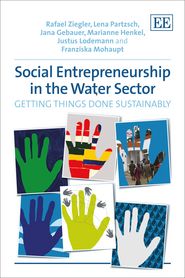New book: Social Entrepreneurship in the Water Sector
How can social entrepreneurship contribute to the sustainable use of water? The book Social Entrepreneurship in the Water Sector aims to answer this question. It presents six case studies of initiatives in Africa, Asia, Europe and Latin America that aimed to find out how the motto ‘Getting Things Done Sustainably’ could be implemented in practice – in areas as diverse as drinking water, sanitation facilities, agriculture, industrial water use and water in ecosystems. The book summarises the findings of the social-ecological research project GETIDOS, run by the University of Greifswald and the IÖW. The project was funded by the Federal Ministry of Education and Research’s social-ecological research funding priority between 2009 and 2013. Two IÖW researchers, Jana Gebauer and Franziska Mohaupt, are among the six authors. An excerpt from the book, which has just been launched, is available on the website of the publisher, Edward Elgar.
The authors went on a journey through the social entrepreneurship landscape in the water sector with the aim of sounding out its potential for contributing to the United Nation’s Millennium Development Goals, specifically in the areas of sustainable water provision and wastewater treatment. The book describes the authors’ trans-disciplinary approach to research and evaluation, offers an overview of regional water problems and methods of resolution and analyses these methods in terms of innovativeness, scalability, legitimacy and sustainability.
Franziska Mohaupt & Rafael Ziegler: ‘Toilets for independence’
This chapter focuses on the ‘Ecotact’, which aims to revolutionise the provision of sanitation facilities ‘for Africa and the world’. Ecotact has developed an innovative, successful business model for providing affordable, decent public sanitation facilities in urban centres. The initiative is currently working on adapting its model so that it can be used in slums and schools, in order to reach particularly disadvantaged groups. Ecotact considers itself a source of ideas and a ‘catalyst’: it offers practical potential solutions that can – and should – be adopted by others. According to Mohaupt und Ziegler, this initiative has shown that it is possible to provide sanitation facilities in a humane and environmentally friendly way. The business model offers possibilities for improvement and adaptation that would be of great benefit to underserved areas such as slums. However, the authors point out that it is still too soon to carry out a final evaluation of the idea.
Jana Gebauer on Viva con Agua
In her contribution, entitled ‘Musketeering for Drinking Water’, Jana Gebauer analyses a Hamburg-based initiative that encourages young people in Germany, Austria and Switzerland to donate money and time to support people in other parts of the world to gain access to clean drinking water. Inspired by Dumas' The Three Musketeers, Viva con Agua de St. Pauli has the following motto: ‘Water for all and all for water’. Viva con Agua considers itself an ‘all profit’ network that benefits all participants: not just those people receiving support, but also the many volunteers, artists, athletes, partner organisations and sponsors who are involved. The project is not just about providing access to water – it is also about fun, friendship, collective learning as part of a meaningful movement and personal development. The article uses the GETIDOS evaluation approach to examine whether and how Viva con Agua has managed to meet its ‘all profit’ objectives.
Further case studies in the book examine projects such as WOTR (‘Watershed Organisation Trust’) in India and ‘People & Water’ in Slovakia. In the section ‘Getting things done together?’ an overall assessment of the initiatives is followed by a discussion by project leader Rafael Ziegler of a ‘live experiment’ by GETIDOS itself: the ‘Big Jump Challenge’ is an annual collaborative competition for water campaigns that are run by youth initiatives. The final will take place in 2015, which is also an important target year as regards the implementation of the European Water Framework Directive.
+++++++++++++++++++++++++
For more information on the book and to access an extract, click here:



